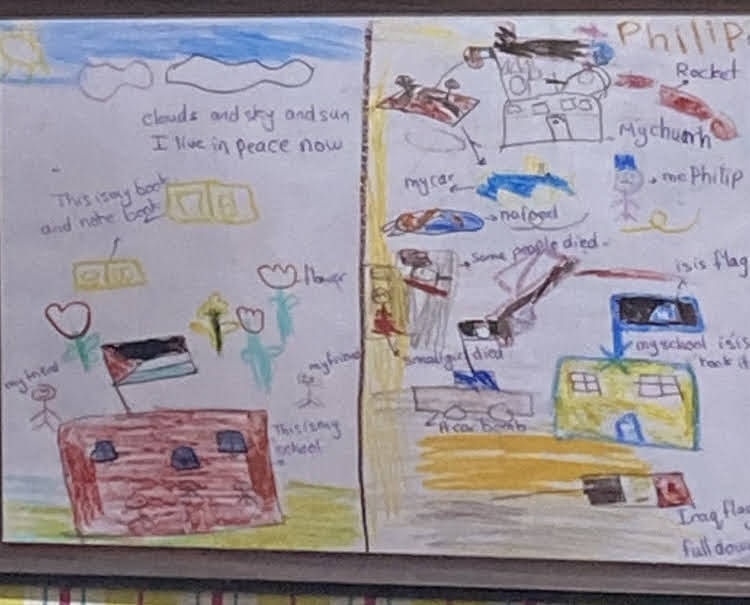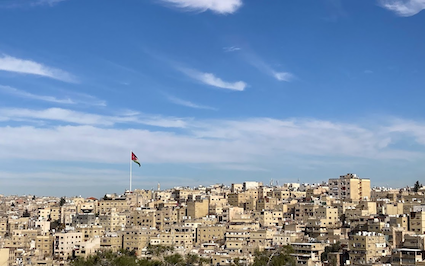Our illustrious and dedicated Templeton student worker, Ellen Francis, asked Morgan Robinette ('23) several questions about her study abroad experience in Amman, Jordan thus far. Morgan responded with the answers (and pictures) included below.
Q: Where are you studying and what are you studying?
A: I’m living in a neighborhood called Shmesani in Amman, Jordan and am studying Arab culture and Islamic religion. We’re also taking a pretty in-depth look at the Israeli-Palestinian conflict, as Jordan has the most Palestinian refugees of any country in the world.
Q: Briefly describe your daily routine in your new location.
A: My first few days in Jordan began with me waking up to the call to prayer that rings out at five in the morning, but it didn’t take long at all

Morgan helps teach math and science lessons
once a week; the school serves refugee families
from Iraq and Syria.
for me to start sleeping right through it. On class days, we start with news and devotions at 8 and then have guest lectures from 9-12:30. Speakers present on a variety of topics about Arab culture, political aspects of the Middle East, conflicts in the region, and principles and foundations of Islamic thought and practice. We also have Arabic class for three hours on Sundays and Wednesdays. After class, our whole group eats lunch together, courtesy of our wonderful cook, Merna, who delivers us homemade, authentic Jordanian meals four days per week. After lunch we have free time, which we can use to study (boring!) or for fun things! Fun things include going for runs, exploring Shmesani, getting shawarma or falafel to snack on, or going to the local mall and markets to chat with local women and practice our Arabic. We end our days with a super fast shower (actually, we only take about three showers per week since Jordan is the most water-poor country in the world). Weekends are devoted to taking trips out of the city, to places like Jaresh and Petra and Aqaba (where the Dead Sea is), and each one is a spectacular adventure! And while bedtime varies from night to night, I’m usually dead asleep in about twenty seconds, regardless of what day it is.
Q: Have you tried any unique cultural experiences? Tell us about them.
A: A key element of living in Jordan is taking taxis; everyone uses taxis, and for someone who’s lived their whole life in po-dunk Amish central PA, taxi rides were a big adjustment! Especially in Amman, where traffic rules are merely suggestions and everyone drives like absolute maniacs. Couple that with the fact that hardly any drivers speak English and you’re in for a guaranteed adventure every time! It’s amazing how quickly we adjusted, though; I’ve only been here a month and I hail taxis all the time now.
Shopping is also much different here! I’ve learned to avoid the neighborhood supermarket, as most items there are imported foreign products that are extremely expensive. On the flip side, if you seek out local shops and manage to surmount the language barrier, you can find your essentials, particularly food, dirt cheap. The produce here is especially great; everything is always in season, and everything’s always farm-to-market fresh. The Balad, or the downtown area, is where we do most of our shopping; not many foreigners go there, and very few people speak English, so it’s a very authentic Jordanian experience (otherwise known as absolutely, positively not Western). The Balad is the picture of chaos, with garbled shouting and haggling in Arabic all around you, chickens and goats roaming amok, and butchers seizing live fish out of murky tanks and whopping off the heads right in front of you. You can also buy produce by the bagful and pay less than two dollars for the lot, and I don’t mean boring apples and sad-looking strawberries; instead you’re talking the best bananas you’ve ever eaten, strawberries that look like rubies, giant mangoes that cut like soft butter and pomegranates the size of your head, not to mention piles of other fruits and veggies you can’t even find at Wegman’s.
**Also fun fact: this Saturday, on Feb. 19, we’re meeting Princess Alia, the sister of His Majesty King Hussein?!? Princess Alia is super involved in animal activism, so she’s giving our group a private tour of a wildlife sanctuary near the Syrian border, and then we’re going to her house—her house—for coffee (which, in this part of the world, also means like eight types of desserts). One of the girls in the program has connections to Princess Alia through horse racing, and that led to our program director, Dr. Doug, getting a WhatsApp call from her to set everything up. Totally. Rad.
Q: Have you tried any new foods that stand out? New music? New (insert items here)? What have been your favorites?
A: Food and hospitality are both huge aspects of Arab culture, which means that we’ve had tons of opportunities to enjoy the local cuisine! Any sort of gathering always involves some kind of food, and meal meals are elaborate affairs, with way more than you could ever possibly eat (but it’s an element of hospitality to make more food than is needed, since guests should be welcomed with abundance and everyone loves leftovers!) Dinner is always followed by dessert, which usually entails some combination of honey, puff pastry, pistachios, cream, chocolate, and fruit. And endless pots of tea and coffee, of course. Meals can last four hours, and are always great times for fellowship and conversation. We’ve had nights when supper lasted till past ten!
The national food of Jordan is a dish called mansef, which is a piece of roasted lamb served over rice and vegetables, along with a tangy yogurt sauce to pour on top. It’s delicious. And aside from tasting great, the traditional way to eat mansef is really cool! When someone invites you to their home for mansef, you eat it Bedouin style, sitting on the ground and eating with your hands out of a common platter. Before you freak out, it’s not as unsanitary as it sounds; you take your shoes off at the door (as you do in any Arab home) and you use little bits of bread to scoop out the food.
Behind mansef, the most popular dish in Jordan is called maqlubeh (the Arabic word for “upside down”). Maqlubeh ingredients can vary, but it always contains some combination of meat (chicken, beef, lamb) and lots of vegetables, all mixed in with rice. When the food is cooked, the meal is served by flipping the pot upside down on the platter and slowly lifting it away, sort of like making a sandcastle of rice, meat, and veggie-filled goodness. You plop a dollop of plain yogurt on top and presto, one of the best things you’ll ever eat. Our landlord, Muhammad, spent a Saturday afternoon with us teaching us how to make maqlubeh. It was so fun! It’s also interesting that maqlubeh isn’t traditional Jordanian, it’s Palestinian. But since half of Jordan’s population is Palestinian, mostly due to the influx of refugees the country has received since the dawn of the Israeli-Palestinian conflict in 1948, Palestinian culture has significantly been integrated with Jordanian culture. There are some problems with this, certainly, but you’d be hard pressed to find a Jordanian who doesn’t like maqlubeh!
Q: Have you noticed things in your new location that are different from the US? Things that are the same?
A: Jordan is modern and technologically advanced, but it’s a tribal society that draws its social customs from its deep Bedouin roots.

The most apparent result of that, and what most differentiates Jordanian culture from the Western world, is seen in male-female relationships. They’re much different than in the US. Intersex friendships aren’t really a thing, and if a male and female are seen in public alone together (without any children, which would indicate marriage) the only other assumption is that they’re siblings. Dating doesn’t occur, most marriages are arranged by families, and it’s considered inappropriate for unrelated members of the opposite gender to hang out alone. Organized, more formal activities, like work functions and recreational sports, can involve mixed-gender groups, but the groups are always on the larger side, and within them genders tend to congregate together. However, don’t let this fool you into equating gender separation with sexism; another result of the deep tribal influence is the extreme emphasis placed on honor, particularly to elders and to women. Because many conservative Muslim women do not feel comfortable removing their coverings or engaging with men in informal settings, many shops, parks, and theatres here are for women and children only. Most restaurants have separate sections for families, where only men accompanied by a wife or adult daughter can enter. And any young man who dares to catcall, harass, or otherwise bother a woman on the street immediately puts himself at risk of swift and oftentimes livid public humiliation; a woman needs only to say ‘Khalas!’ (stop!), and everyone around her will immediately begin to shout at and shame the foolish shebab who gave out a wolf-whistle.
Q: What has surprised you most about living abroad?
A: I’ve been most amazed by the hospitality I’ve found here. Every Jordanian I’ve met so far, from shopkeepers to restaurant staff to taxi drivers, has been nothing but friendly and warm. Everyone lights up when I attempt to use Arabic, and even though it’s broken, limited, and heavily laden with what I can only imagine is a raging white girl accent, my Arabic is always greeted with enthusiasm and delight. Taxi drivers know the city inside and out and can get you anywhere, and none of them ever try to rip you off; neither do street vendors or shopkeepers. Many times I’ve handed them way too much by mistake, and they always say “La, la, mushkeleh,” (‘No, no, too much) and hand me the proper amount back. For someone who speaks very little Arabic and is usually buying things with no price tags, they could easily take all I give and ask for more, but not once has anyone done so. I’m completely comfortable walking around the city alone, and I’ve been out many times even at night with no problems. I feel far safer in Amman at night than I do in Philly in the middle of the day, which is something I never would’ve expected.
Another major thing I never would’ve expected is how well my Christian faith has been received. The Islamic world has a reputation for being oppressive and sometimes violent toward other religions, and in some countries that’s the case, but certainly not Jordan. The biggest mosque in Amman is right across the street from the biggest Coptic church. That’s not to say that ‘religious freedom’ exists here like it does in the West (schools are all Islamic, non-Muslims can’t run for public office, and proselytizing can get you thrown in prison or worse) but the religions of foreigners and expats are well respected. Most of all, the culture as a whole is in itself religious; atheism and agnosticism are absurd concepts to Muslims, and even those who don’t practice believe in God. Of course there’s a God, they say when you ask. I’m alive and breathing, how could that be so if there was no God? Because of that, along with the warmth and friendliness exuded by everyone I’ve met, I’ve never felt uncomfortable or threatened when talking about my relationship with Christ with my Jordanian friends. They welcome and encourage those conversations, and are eager to hear how my love for Him shapes my life. I’ve honestly found it easier to talk about my faith here than in some places in the States!
One last note, and one that’s way less deep but was also TOTALLY unexpected: I’ll be getting the chance to compete in a truly epic race this semester as a member of a ten-person team that will run from the Dead Sea to the Red Sea—150 miles! Split between ten people, that’s 15 miles each, run in one-kilometer segments. The race will take 15-18 hours, and it’s gonna be wild! It also might kill me, but yooo, it’s so worth it!!
Q: How have your studies changed since going abroad?
A: The one’s simple—no more labs! All this religion/culture/anthropology stuff is a whole different ball game for a biochem major, but it’s been good. Way more reading and writing than I’m used to, but that’s alright. It’s forcing me to become a better typist, in any case.
Q: Would you recommend the study abroad experience to other students? Would you recommend your location in particular? Why?
A: I firmly believe that everyone should study abroad if possible, and if they think it isn’t possible, they should really take a second look at their reasoning on that one. The world is so big, and the challenges and adventures you face when you study abroad cause you to grow and change and come away as a more complete person. As far as Jordan goes, absolutely you should study here! Come to practice Arabic, to learn how to take two-minute showers, and to spend fifty cents on falafel sandwiches from Abu Salim on the street corner. Come for the unpredictable weather and indoor temperatures, the crazy taxi rides, and the thrills of haggling in the chaotic markets. But more than that, come to see how beautiful, wonderful, and loving Muslims can be, and to look past the misconceptions and unfortunate presuppositions about Islam that most of us share in the West. Come to hear the call to prayer five times a day and observe the faithful as they bow to the ground, facing Mecca, and pour out their petitions to the mighty Allah. Come see how Jesus is evident in this part of the world, to witness God’s love for the Middle East and to foster that love in your own heart, too.








